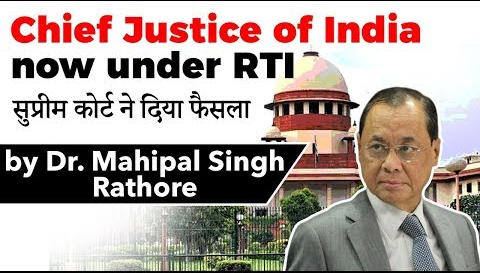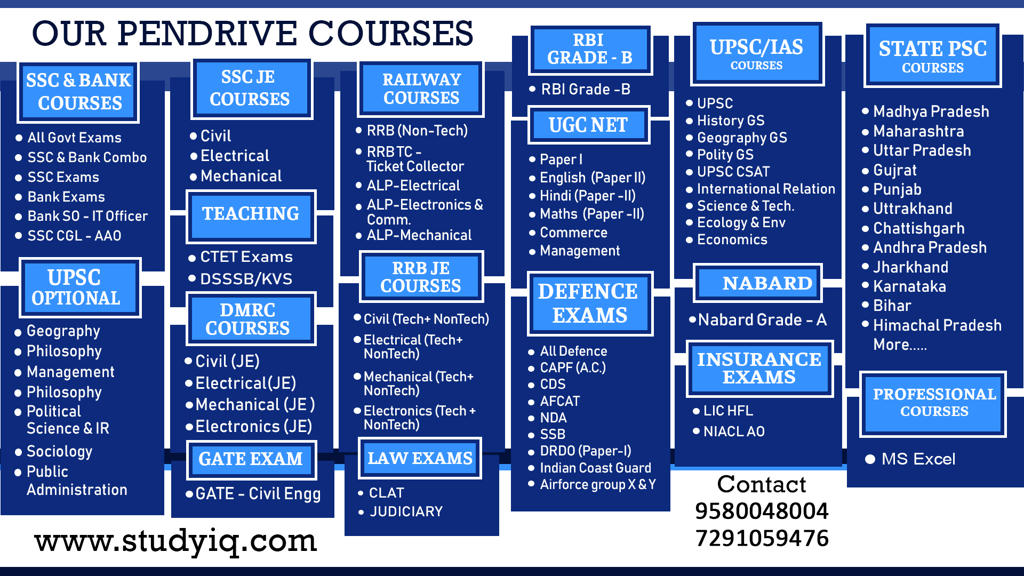Table of Contents

Why in News?
- The Supreme Court has ruled that the office of the Chief Justice of India (CJI) is a public authority under the Right to Information (RTI) Act, 2005.
- A five-judge Constitution Bench headed by Chief Justice Ranjan Gogoi gave the ruling.
History of the case
- The judgment pertained to a case based on requests for information filed by Delhi-based RTI activist Subhash Agarwal, all of which eventually reached the Supreme Court.
- 2009 – Agarwal had asked whether all Supreme Court judges had declared their assets and liabilities to the CJI following a resolution passed in 1997.
- CPIO of the Supreme Court said the office of the CJI was not a public authority under the RTI Act
- The matter reached the Chief Information Commissioner (CIC) – full Bench of CIC directed disclosure of information
- The Supreme Court approached the Delhi High Court against the CIC order.
- High Court held on September 2, 2009 that “the office of the Chief Justice of India is a public authority under the RTI Act and is covered by its provisions”.
- The Supreme Court then approached a larger Bench comprising then Chief Justice (of Delhi High Court) Ajit Prakash Shah, Justice Vikramjit Sen, and Justice S Muralidhar.
- January 2010 – The larger bench passed its judgment holding that the previous judgment of single judge bench(Justice Bhatt) was “both proper and valid and needs no interference”. ‘’Judicial independence was not a judge’s privilege, but a responsibility cast upon him.’’
Supreme court in Supreme court!
- 2010 – The Secretary general of Supreme Court petitioned the Supreme court itself challenging the Delhi High Court order.
- The matter was placed before a Division Bench, which decided that it should be heard by a Constitution Bench
- The setting up of the Constitution Bench remained pending for 9 years (under 10 CJIs)
- 2018 – CJI Gogoi constituted the Bench
- April 2019 – The bench reserved its judgment
- November 2019- Judgement pronounced
RTI Act, 2005
- Section- 2(j) : “Right to Information” means the right to information accessible under this Act which is held by or under the control of any public authority and includes the right to:
- Inspection of work, documents, records;
- Taking notes, extracts or certified copies of documents or records;
- Taking certified samples of material;
- Obtaining information in the form of diskettes, floppies, tapes, video cassettes or in any other electronic mode or through printouts where such information is stored in a computer or in any other device.
What is Public Authority acc to RTI act?
- “Public authority” means any authority or body or institution of self government established or constituted—
- by or under the Constitution;
- by any other law made by Parliament/State Legislature.
- by notification issued or order made by the appropriate Government, and includes any body owned, controlled or substantially financed;
- non-Government organisation substantially financed, directly or indirectly by funds provided by the appropriate Government.
Highlights of the Ruling
- The Supreme Court is a “public authority” and the office of the CJI is part and parcel of the institution.
- Hence, if the Supreme Court is a public authority, so is the office of the CJI.
- The judiciary cannot function in total insulation as judges enjoy a constitutional post and discharge public duty.
Terms and conditions**
- The right to know is not absolute. The right to know of a citizen ought to be balanced with the right to privacy of individual judges.
- Right to Privacy is an important aspect and has to be balanced with transparency while deciding to give out information from the office of the Chief Justice of India.
- RTI cannot be used as a tool of surveillance and that judicial independence has to be kept in mind while dealing with transparency.
The checks
- Personal information of judges should only be divulged under RTI if such disclosure served the larger public interest.
- The disclosure of personal information was discretionary under Section 8(1)(j) of the RTI Act. The statute has given the discretion to the Public Information Officer (PIO).
- Information about assets of judges and official communication during the process of elevation of judges to the Supreme Court are treated as confidential third-party information.
- In such cases, a notice should be first issued to the third party — the judge concerned — about the RTI request for information. The view of the third party should be considered before the PIO takes a call.
What institutions are exempt from RTI?
- Political parties
- CBI – the CBI demanded exemption only for units in intelligence gathering, exemption was granted in 2011 to the agency as a whole.
- Most of the other intelligence gathering agencies
- Offices of the Prime Minister and the President which are public authorities under the RTI Act have often denied information Dr. Mahipal Singh Rathore THANK YOU mahipalrathore rathore.mahipal mahipalsinghrathore
Latest Burning Issues | Free PDF






















 WhatsApp
WhatsApp